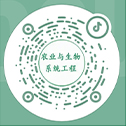| [1] |
罗锡文,廖娟,胡炼,等. 提高农业机械化水平促进农业可持续发展[J]. 农业工程学报, 2016, 32(1): 1-11.Luo Xiwen, Liao Juan, Hu Lian, et al. Improving agricultural mechanization level to promote agricultural sustainable development[J]. Transactions of the Chinese Society of Agricultural Engineering (Transactions of the CSAE), 2016, 32(1): 1-11. (in Chinese with English abstract)
|
| [2] |
刘慧. 解决低端产能过剩,新技术、新产品供给不足等难题:农机补贴新规支撑农业绿色发展[N]. 经济日报,2019-03-27.
|
| [3] |
Ji Y Q, Yu X H, Zhong F N. Machinery investment decision and off-farm employment in rural China[J]. China Economic Review, 2011, 23(1): 71-80.
|
| [4] |
Muller M. Leadership in agricultural machinery circles: experimental evidence from Tajikistan[J]. Australian Journal of Agricultural and Resource Economics, 2020, 64(2): 533-554.
|
| [5] |
张标,张领先,傅泽田,等. 农户农机需求及购买行为分析:基于18省的微观调查数据实证[J]. 中国农业大学学报,2017,22(11):208-223.Zhang Biao, Zhang Lingxian, Fu Zetian, et al. Analysis on farmers' requirement for agricultural machinery and purchasing behavior: Based on the survey data of 18 provinces[J]. Journal of China Agricultural University, 2017, 22(11): 208-223. (in Chinese with English abstract)
|
| [6] |
曹光乔,周力,易中懿,等. 农业机械购置补贴对农户购机行为的影响:基于江苏省水稻种植业的实证分析[J].中国农村经济,2010,(6): 38-48.
|
| [7] |
王许沁,张宗毅,葛继红. 农机购置补贴政策、效果与效率:基于激励效应与挤出效应视角[J]. 中国农村观察,2018(2):60-74.Wang Xuqin, Zhang Zongyi, Ge Jihong. The effects and efficiency of agricultural machinery purchase subsidies: From the perspective of incentive effect and crowding-out effect[J]. China Rural Survey, 2018(2): 60-74. (in Chinese with English abstract)
|
| [8] |
冷博峰,冯中朝,周晓时,等. 农机购置补贴对农户购机投入模型与影响分析[J]. 农业工程学报,2020,36(23):324-334.Leng Bofeng, Feng Zhongchao, Zhou Xiaoshi, et al. Modeling and analysis of the effects of agricultural machinery purchase subsidies on farmers' agricultural machinery investment[J]. Transactions of the Chinese Society of Agricultural Engineering (Transactions of the CSAE), 2020, 36(23): 324-334. (in Chinese with English abstract).
|
| [9] |
路玉彬,周振,张祚本,等. 改革开放40年农业机械化发展与制度变迁[J]. 西北农林科技大学学报:社会科学版,2018,18(6):18-25.Lu Yubin, Zhou Zhen, Zhang Zuoben, et al. Institutional change during development process of agricultural mechanization in 40 years of reform and opening up in China[J]. Journal of Northwest A & F University: Social Science Edition, 2018, 18(6): 18-25. (in Chinese with English abstract)
|
| [10] |
张露,罗必良. 小农生产如何融入现代农业发展轨道:来自中国小麦主产区的经验证据[J]. 经济研究, 2018, 53(12): 144-160.Zhang Lu, Luo Biliang. How can small farmers be incorporated into modern agricultural development? Evidence from wheat: producing areas of China[J]. Economic Research Journal, 2018, 53(12): 144-160. (in Chinese with English abstract)
|
| [11] |
Sok J, Borges J R, Schmidt P, et al. Farmer behaviour as reasoned action: A critical review of research with the theory of planned behaviour[J]. Journal of Agriculture Economics, 2021, 72(2): 388-412.
|
| [12] |
Ajzen I. The theory of planned behavior[J]. Organizational Behavior and Human Decision Processes, 1991, 50(2): 179-211.
|
| [13] |
Genovaite L, Renta D, Romualdas G. The determinants of renewable energy usage intentions using theory of planned behavior approach[J]. Renewable Energy, 2021, 170: 587-594.
|
| [14] |
Damalas C A. Farmers' intention to reduce pesticide use: the role of perceived risk of loss in the model of the planned behavior theory[J]. Environmental Science and Pollution Research International, 2021, 28(26): 35278-35285.
|
| [15] |
杨志海. 老龄化、社会网络与农户绿色生产技术采纳行为:来自长江流域六省农户数据的验证[J]. 中国农村观察,2018(4):44-58.Yang Zhihai. Aging, social network and the adoption of green production technology: Evidence from farm households in six provinces in the Yangtze River basin[J]. China Rural Survey, 2018(4): 44-58. (in Chinese with English abstract)
|
| [16] |
张高亮,张璐璐,邱咸,等. 基于计划行为理论的渔民参与专业合作组织行为的产生机理[J]. 农业经济问题,2015,36(8): 97-104.
|
| [17] |
Warner L A, Diaz J M, Silvert C, et al. Predicting intentions to engage in a suite of yard fertilizer behaviors: integrated insights from the diffusion of innovations, theory of planned behavior, and contextual factors[J]. Society & Natural Resources, 2021, 34(3): 373-392.
|
| [18] |
俞振宁,谭永忠,练款,等. 基于计划行为理论分析农户参与重金属污染耕地休耕治理行为[J]. 农业工程学报,2018,34(24):266-273.Yu Zhenning, Tan Yongzhong, Lian Kuan, et al. Analysis on fallow governance behavior of farmers in heavy metal polluted region based on theory of planned behavior[J]. Transactions of the Chinese Society of Agricultural Engineering (Transactions of the CSAE), 2018, 34(24): 266-273. (in Chinese with English abstract)
|
| [19] |
Wang Y D, Liang J P, Yang J, et al. Analysis of the environmental behavior of farmers for non-point source pollution control and management: an integration of the theory of planned behavior and the protection motivation theory[J]. Journal of Environmental Management, 2019, 237: 15-23.
|
| [20] |
刘伟,童洪志,丁卡尼. BOP战略背景下影响农机扩散的政府补贴因素分析:基于多Agent建模的仿真研究[J].管理评论,2017,29(7):200-212.Liu Wei, Tong Hongzhi, Ding Kani. Analysis of governmental subsidy factors influencing agri-machinery diffusion under the background of BOP strategy: Simulation research based on multi-agent modeling[J]. Management Review, 2017, 29(7): 200-212. (in Chinese with English abstract)
|
| [21] |
黄祖辉,钟颖琦,王晓莉. 不同政策对农户农药施用行为的影响[J]. 中国人口·资源与环境,2016,26(8):148-155.Huang Zuhui, Zhong Yingqi, Wang Xiaoli. Study on the impacts of government policy on farmers' pesticide application behavior[J]. China Population Resources and Environment, 2016, 26(8): 148-155. (in Chinese with English abstract)
|
| [22] |
Paudel G P, Bahadur K C D, Rahut D B, et al. Smallholder farmers' willingness to pay for scale-appropriate farm mechanization: evidence from the mid-hills of Nepal[J]. Technology in Society, 2019, 59: 1-10.
|
| [23] |
王文信,徐云,王正大. 农机购置补贴对农户购机行为的影响[J]. 农业机械学报,2020,51(5):151-155.Wang Wenxin, Xu Yun, Wang Zhengda. The influence of agricultural machinery purchase subsidies on farmers' purchase behavior[J]. Transactions of the Chinese Society for Agricultural Machinery, 2020, 51(5): 151-155. (in Chinese with English abstract)
|
| [24] |
Liang L, Ridoutt B G, Lal R, et al. Nitrogen footprint and nitrogen use efficiency of greenhouse tomato production in North China[J]. Journal of Cleaner Production, 2019, 208: 285-296.
|
| [25] |
Davis G W, Bailey D, Chudoba K M. Defining and meeting the demand for agricultural machinery in China: A case study of John Deere[J]. International Food and Agribusiness Management Review, 2010, 13(3): 97-120.
|
| [26] |
Diao X S, Cossar F, Houssou N, et al. Mechanization in Ghana: emerging demand, and the search for alternative supply models[J]. Food Policy, 2014, 48: 168-181.
|
| [27] |
曹海英. 消费者绿色购买行为影响因素的实证分析[J]. 统计与决策,2018,34(14):112-114.
|
| [28] |
Cialdini R B, Kallgren C A, Reno R R. A focus theory of normative conduct: A theoretical refinement and reevaluation of the role of norms in human behavior[J]. Advances in Experimental Social Psychology, 1991, 24(1): 201-234.
|
| [29] |
Mohr S, Kühl R. Acceptance of artificial intelligence in German agriculture: An application of the technology acceptance model and the theory of planned behavior[J]. Precision Agriculture,2021, 22(6): 1-29.
|
| [30] |
李宁,汪险生,王舒娟,等. 自购还是外包:农地确权如何影响农户的农业机械化选择?[J]. 中国农村经济,2019(6):54-75.Li Ning, Wang Xiansheng, Wang Shujuan, et al. Self purchase or outsourcing: how does farmland right confirmation affect farmers' choice of agricultural mechanization?[J]. Chinese Rural Economy, 2019(6): 54-75. (in Chinese with English abstract)
|
| [31] |
Safa L, Saghinsara V M. Understanding rural people's engagement in pro-environmental behaviors: An integrated conceptual framework[J]. Journal of Agriculture Science and Technology, 2020, 22(5): 1205-1217.
|
| [32] |
许秀川,李容,李国珍. 小规模经营与农户农机服务需求:一个两阶段决策模型的考察[J], 农业技术经济,2017(9):45-57.
|
| [33] |
陈新建,黄嘉升. 生产风险、风险规避与农户农业生产机械投资:购买机械还是购买服务?[J]. 农业现代化研究,2020,41(5):803-812.Chen Xinjian, Huang Jiasheng. Production risk, risk aversion and farmers' agricultural machinery investment choice: Buy machinery or buy services?[J]. Research on Agricultural Modernization, 2020, 41(5): 803-812. (in Chinese with English abstract)
|
| [34] |
Fishbein M, Ajzen I. Predicting and changing behavior: The reasoned action approach[Z]. New York: Psychology Press, 2010.
|
| [35] |
王春晓,陈姝彤,徐坤. 研究生科学数据共享态度与共享意愿关系研究[J]. 情报科学,2020,38(12):78-84.Wang Chunxiao, Chen Shutong, Xu Kun. The relationship between postgraduates' attitude and willingness to share scientific data[J]. Information Science, 2020, 38(12): 78-84. (in Chinese with English abstract)
|
| [36] |
陈劼绮,李桂莎,陆林. 旅游纪念品:买还是不买?基于矛盾态度理论的消费者购买意愿研究[J]. 旅游科学,2021,35(4):108-127.Chen Jieqi, Li Guisha, Lu Lin. Souvenirs: To buy or not to buy? A study on consumers' purchase intention based on the theory of ambivalent attitude[J]. Tourism Science, 2021, 35(4): 108-127. (in Chinese with English abstract)
|
| [37] |
畅倩,颜俨,李晓平,等. 为何"说一套做一套":农户生态生产意愿与行为的悖离研究[J]. 农业技术经济,2021(4):85-97.Chang Qian, Yan Yan, Li Xiaoping, et al. Why "say one thing and do another": A study on the deviation of willingness and behavior of farmers' ecological production[J]. Journal of Agrotechnical Economics, 2021(4): 85-97. (in Chinese with English abstract)
|




 下载:
下载:





